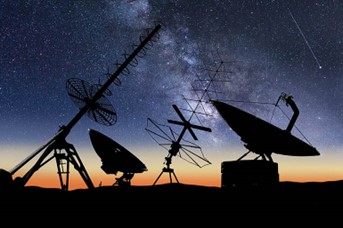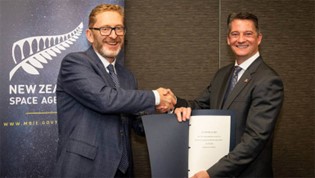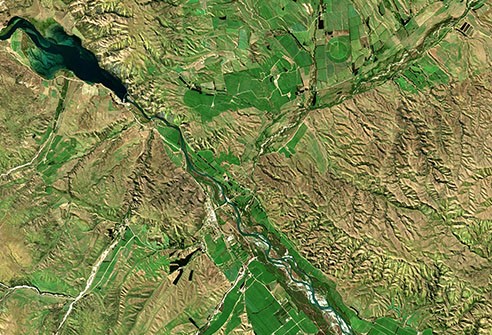National Space Policy
The National Space Policy outlines New Zealand’s values and objectives on space. It is a key tool to help officials across government inform space policy development and undertake engagements on space in New Zealand and internationally.
On this page
The Minister for Economic Development announced the release of the National Space Policy on 31 May 2023.
See below for HTML version. Additional information to support the Policy’s objectives will be updated regularly.
The values and objectives in the National Space Policy were informed by the Space Policy Review public consultation which took place in September and October 2022.
New Zealand Space Policy Review consultation (closed)
The Space Policy Review: National Space Policy Cabinet paper is available here.
Foreword from the Minister for Economic Development
This National Space Policy is an important milestone in New Zealand’s journey as a space-faring nation. It provides, for the first time, an accessible overview of the New Zealand government’s values and objectives on space.
New Zealand’s involvement in space has grown markedly since the decision by Rocket Lab to launch their small orbital rockets from New Zealand, and the subsequent creation of the New Zealand Space Agency to support the passage, and implementation of, the Outer Space and High-altitude Activities Act 2017.
A 2019 report produced by Deloitte found the New Zealand space sector contributed $1.69 billion to our national economy in 2018-19 and supported 12,000 jobs. Due to New Zealand’s increasing role across the space value chain (from manufacturing through to end use of space data), I anticipate these economic benefits will continue to grow.
The New Zealand government will use this document as the reference to consistently communicate New Zealand’s interests both on and offshore, to inform the creation of future space policies, and our overall direction in this important sector of our economy.
Thank you to those New Zealanders who provided feedback as part of the public consultation from September to October 2022. Feedback from that consultation has informed the values and objectives in this document, and New Zealand’s progression as an innovative and responsible space nation.
Informing New Zealand’s space policies and engagements
The values and objectives within this document will assist New Zealand government officials to articulate New Zealand’s interests in space on and offshore and to inform the development of future space policies.
This page notes the underlying obligations and interests which have informed the values and objectives, and supplementary information on the National Space Policy.
Obligations which apply to all New Zealand space policies
All space policies must also be consistent with New Zealand’s existing commitments, including:
- International obligations: notably the main international agreements that promote a safe, responsible, sustainable and peaceful space environment.
International obligations and space - Te Tiriti o Waitangi: a commitment between the Crown and Māori which provides the basis for ongoing partnerships between the government and Māori on space, including on the implementation of these values and objectives. The Crown is committed to recognising and reflecting Māori interests, including those embodied in the Treaty principles of partnership, active protection, and participation.
Engagement on space policy - New Zealand’s domestic laws and policies: including the Outer Space and High-altitude Activities Act 2017.
The Outer Space and High-altitude Activities Act 2017(external link) — legislation.govt.nz
Supporting the New Zealand government’s interests
The broad language of the National Space Policy reflects a range of New Zealand government interests in space. This enables officials to:
- Support broader government interests when developing and promoting space policies; including environmental, economic, national security, safe and secure regulation, and international interests.
information on New Zealand’s international obligations relating to space
- Prioritise certain space activities, engagements or opportunities that may arise in future, based on their applicability to these values and objectives.
Information on the implementation of the National Space Policy
Further information on how the values and objectives are being implemented across government through a range of space workstreams and engagements can be found on the Ministry of Business, Innovation and Employment website.
Values
The following are values that the New Zealand government will reflect and promote through New Zealand’s space activities, engagements and the use of space technologies.
Stewardship
The New Zealand government aims to:
- Preserve the benefits of space and Earth environments for future generations.
- Advocate internationally for the sustainable use of space to ensure its benefits remain available to future generations.
- Use space-based technologies and space-derived data to understand the Earth environment and better manage natural resources.
Innovation
New Zealand encourages responsible innovation, science, and technology which enables:
- Creative problem-solving to open up new and innovative uses of space and space-based assets, including in pursuit of New Zealand’s interests.
- Collaboration with space sector companies and other governments to progress and protect New Zealand’s interests where we have particular innovative strengths.
- Driving productivity growth in the economy and improving the wellbeing of New Zealanders through the innovative applications of space-derived data.
Responsibility
New Zealand recognises that outer space is shared by all humankind, and that space activities can benefit or impact the interests of all countries. New Zealand advocates for a peaceful, sustainable, safe and secure space environment. We will inform responsible behaviours through:
- Acting in accordance with international law, agreements and arrangements applicable to space, as well as New Zealand’s domestic law and policies.
- Seeking to influence the development of new international instruments, and developing international norms and standards with like-minded countries, where there are gaps.
- Transparent communication regarding the government’s space functions, policies and engagements.
Partnership
The New Zealand government aims to engage effectively within New Zealand and internationally on space. This includes through:
- Working in partnership with Māori: The government is committed to the ongoing engagement and involvement of Māori in the development and implementation of space policies.
- Public engagement: The government works alongside New Zealanders and the space sector in developing policy and regulations that impact them. This includes providing information on the government’s space functions, policies, processes and engagements.
- International engagement: Collaboration on space issues with international partners on economic, security and other interests and within international institutions to promote New Zealand’s values and objectives.
- Space sector: Collaboration with the space sector on sustainable and inclusive space opportunities, in line with New Zealand’s values and objectives.
Objectives
The following objectives aim to progress the New Zealand government’s interests in space.
Growing an innovative and inclusive space sector
Promoting New Zealand’s natural advantages and research and development expertise across the space value chain
New Zealand offers natural benefits for space activities, including: having one of the world’s widest launch angles (azimuths) for rocket launches, a good location for ground-based space infrastructure, and testing remote sensing space technologies on our varied landscape. New Zealand also has research and development expertise across the space value chain (from manufacture to end use) including on planetary science, rocketry and propulsion, remote sensing data analytics, and life sciences in space. Promoting these advantages and expertise can attract further collaboration on space and will help grow the space sector.
More information
Partnering within New Zealand and internationally to increase New Zealand’s space sector capabilities
There is an opportunity to grow New Zealand’s capability including, but not limited to, research and development across the space value chain. New Zealand has existing partnerships and investments with other space agencies, international companies and academic institutions. Our existing partnerships are in a range of areas including science missions, for the use and protection of land for launch activities, and space scholarships. Through these and future partnerships, the New Zealand government aims to support end-to-end New Zealand research and development capabilities across the space value chain (e.g., designing, building, launching, operating, and using the data from satellites). Partnerships with innovators and investors can support economic and regional development, including through encouraging new space start-up activity and providing access to essential infrastructure and investment.
More information
Identifying opportunities to increase knowledge of, and diversity in, the New Zealand space sector
A diverse space sector can help ensure that the benefits of space technologies and their data are shared with underrepresented communities. The New Zealand government aims to increase diverse and inclusive participation and partnership in the space sector, and the science and research sector more broadly. The New Zealand government will seek to identify opportunities to increase knowledge of, and diversity in, the space sector through supporting broader participation in space education, trades training, and the space workforce. As part of informing diverse space policies and sector development initiatives, the New Zealand government will engage mātauranga Māori expertise.
More information
Using cutting-edge space technology and space sourced data to support and protect New Zealand’s interests
With an increase in commercial space activity and high-value science, there is likely to be a significant increase in data generated by suborbital and orbital satellites and space-based technologies. The government aims to be an early adopter and investor in space technologies, alongside fit-for-purpose regulation, and a user of space data to solve problems. This can lead to direct and indirect benefits for New Zealanders and the value of these benefits will be communicated to foster greater engagement and interest in space.
More information
Protecting and advancing New Zealand’s national security interests
Using space assets to protect and advance New Zealand’s national security interests
Space-based capabilities deliver a wide range of essential services that underpin daily life in New Zealand, including: communications, navigation, remote sensing, Earth observation, weather services, and financial transactions.
The New Zealand government also uses space-based assets and capabilities to protect and advance New Zealand’s national security interests, which includes New Zealand’s economic wellbeing as well as advancing the security of our Pacific partners. This use is significantly reliant upon capabilities which are owned by our international partners.
The space domain enables a deeper understanding of New Zealand’s security environments, including improving the timeliness of information on security issues. The use of space assets will continue to enable better communication, faster and better-informed decision making and more effective operational outputs for New Zealand’s national security agencies; this includes maintaining an effective, efficient, combat-capable and flexible New Zealand Defence Force, which is able to fulfil the tasks government sets for it.
Subject to our international obligations and domestic legislation, the New Zealand government will continue to make use of space-based assets and capabilities to protect our national security and advance our national interests.
More information
Understanding and managing the broad range of security risks in space and on Earth to protect New Zealand’s national security interests
Strategic competition on Earth is increasingly replicated in space, endangering the security and stability of this critical domain. The potential for conflict in space creates additional risks to New Zealand’s interests, including the potential for disruption to critical national infrastructure that need to be understood and managed. Disruption can be from remote or direct physical interference with space systems through a range of means, both human-induced (e.g., space debris or active targeting) and natural (e.g., space weather). The New Zealand government will seek to further understand risks and proactively mitigate threats in and from space.
More information
Enhancing collaboration with the domestic space sector and international space and security partners in pursuit of New Zealand’s national security interests
New Zealand is reliant on space assets from international space and security partners. Nearly all of the space systems and assets that New Zealand relies upon are designed, manufactured, launched, and controlled overseas. Our collaborations enhance collective security efforts and demonstrate New Zealand’s commitment to our partners and the international rules-based system. To pursue the government’s national security objectives, the New Zealand government will also aim to develop and retain its own domestic space capabilities and knowledge, including through collaborations between government and the broad space sector (including academia and industry) to assist with space security issues.
More information
Regulating to ensure space activities are safe and secure
Facilitating the safe and secure use of emerging space technologies from New Zealand
The key purpose of the Outer Space and High-altitude Activities Act 2017 – which governs space regulation in New Zealand - is to facilitate the development of New Zealand’s space industry and provide for its safe and secure operation. This includes preserving New Zealand’s national security and national interests and adhering to our international obligations relating to space activities. The New Zealand government will continue to facilitate an enabling environment for space technologies in New Zealand, to encourage their uptake and integration, alongside fit-for-purpose regulation.
More information
Clarifying what space activities are inconsistent with New Zealand’s national interest
The Minister for Economic Development can approve the launch of a payload from New Zealand if certain tests are met – including relating to the safety of the payload and compliance with international obligations. However, even if those tests are met, a payload can be declined if its intended use is inconsistent with New Zealand’s national interest. For this, the Minister may consider: economic or other benefits to New Zealand; risks to national security, public safety, international relations or other national interests; risks that cannot be mitigated by conditions of the licence or permit; and any other relevant matters.
New Zealand’s broad interests are consistent and enduring (including economic, national security, safe and secure regulation, international and environmental interests). Broad national interest language, when assessing the proposed operation of payloads, is required to respond to changing domestic and international circumstances and ensure New Zealand interests can be considered as applicable at the time. Payload permit applications, including those with national security applications, will continue to be assessed on a case-by-case basis.
In 2019, the government set out specific activities that are not in New Zealand’s national interests with respect to authorising payloads, and New Zealand has since prohibited and condemned the testing of destructive direct-ascent antisatellite (ASAT) weapons. The New Zealand government will further clarify (including through national interest policy processes) and communicate space activities which are deemed inconsistent with the national interest as these are considered.
More information
Promoting and protecting New Zealand’s interests through permitting space technologies
As one of the world's few launching states, New Zealand has the opportunity to promote and protect our interests globally, including through facilitating the regulation of space technologies in New Zealand that align with our values (stewardship, innovation, responsibility and partnership). New Zealand aims to actively participate in space policy and regulatory fora on responsible space behaviour, removing international debris from space, global space traffic management and space situational awareness. The government will also continue to develop regulatory policies (for example, on active debris removal), consistent with the values and objectives in this document, including to protect our interests in the accessibility of space for all and promote innovative uses of space.
More information
Promoting the responsible uses of space internationally
Advocating for effective international rules, norms and standards in space
New Zealand is party to the main international space treaties which are reflected in our domestic laws and policies. Although these international agreements provide the legal framework for space activity, the global space context has evolved in the decades since the agreements were reached, including through the growing number of countries and commercial operators active in space, the development of new space technologies and the rapid increase in the amount of space activity. Further work is needed to ensure that the international regulatory framework for all space activities is fit-for-purpose in the modern space context.
International obligations and space
New Zealand advocates for a space environment that is peaceful, sustainable, safe and secure. We also recognise both the importance of the international legal framework in the space context, and the need to develop this framework and respond to advances in technology. We will continue to advocate for additional rules, norms and standards where these are needed.
The New Zealand government will prioritise engagement on responsible behaviours in outer space, including within the United Nations, in alignment with our values and objectives. New Zealand’s defence and security agencies will promote these responsible behaviours through its use of space.
More information
Partnering with like-minded launch states to adopt peaceful, responsible and sustainable space practices
Every country has an interest in ensuring the orbital space around Earth is accessible and sustainable. New Zealand will continue to partner with like-minded launch states and satellite owners on common values and objectives – including in line with those outlined in this National Space Policy. New Zealand will engage in international space initiatives and will maintain an independent foreign policy, making decisions on the basis of our own national interests. New Zealand’s space and security partnerships also provide broader benefits to our national security and our international relations. New Zealand will participate in, and support, initiatives led by other launch states where they align with New Zealand’s interests and are consistent with our domestic laws and policies and our international obligations.
More information
Collaborating internationally to increase New Zealand’s influence and capabilities in the global space sector
New Zealand will collaborate internationally to explore space and monitor the Earth through the use of space, in line with our values and objectives. We see this as an opportunity for scientists, researchers and other New Zealanders to join international efforts and to share knowledge from space exploration and Earth observation endeavours for the benefit of humankind. New Zealand’s contributions to space exploration and Earth observation can also advance technology solutions or science in areas of national importance, including climate change and disaster management, particularly in the Pacific, and our sustained scientific investigations of Antarctica. In line with key sustainability interests in this document, New Zealand also aims to be at the forefront of global sustainable space activities - and to influence other space actors to adopt sustainable space practices.
More information
Modelling sustainable space and Earth environments
Encouraging inclusive, sustainable space collaborations within New Zealand
Mātauranga Māori and space are deeply connected, with space representing whakapapa (genealogical links to the beginning of the universe), wairuatanga (the spiritual connection between Earth and the universe, derived from Māori cosmology), and tātai arorangi (Māori knowledge of astronomy). The New Zealand government encourages inclusive collaborations with individuals or groups who are currently underrepresented in the space sector (including, but not limited to, Māori); and for these collaborations to work toward sustainable outcomes. The New Zealand government will also strive to further understand and assess representation across the space sector, to best direct inclusive collaboration opportunities.
More information
Assessing the cumulative impact of space activities on Earth and space environments
Further work is required to understand the cumulative impact of space activities on Earth (e.g., land, sea, atmosphere and the night sky); including the environment of New Zealand communities who have concerns about launch activities in their area. The New Zealand government will continue to gather environmental data and undertake further research to assess the impact of space activities from New Zealand, to then inform any policy considerations. This includes assessing the impact of space activities on space environments the New Zealand government operates in, including but not limited to the Earth’s atmosphere, the night sky, orbit around Earth, and cislunar environment, to inform consideration of sustainable space policies.
More information
Assisting with solving sustainability challenges through space data, including to better monitor or understand the Earth's environment
Space technologies and data can assist with a range of sustainability challenges including: contributing toward achieving the UN 2030 Sustainable Development Goals; mitigating global emissions; delivery of education and health care; providing early warning of, and improving responses after, natural disasters; contributing to objectives within the Climate Change Response (Zero Carbon) Amendment Act 2019 and the Ozone Layer Protection Act 1996; and monitoring agriculture and variables that affect crops. New Zealand aims to lead sustainable space access by creating innovative and flexible policies to enable the removal of space debris and reducing the amount of time in which derelict objects stay in orbit. The New Zealand government will also explore further opportunities for space data to address national sustainability challenges.
More information
Investing in New Zealand’s capability to retain, grow, access and use sustainable space technologies
The New Zealand government will continue to invest in New Zealand’s capability to retain, grow, access, and use sustainable space technologies; including to understand and mitigate a range of global issues, such as global emissions. This could include investing in joint space missions in line with New Zealand’s interests or, with continued development of New Zealand’s capabilities across the space value chain, investing in New Zealand’s own missions.
More information
Role of the New Zealand government: National Space Policy implementation
The following agencies have a role in the implementation of this National Space Policy; including using the values and objectives above to inform the development of future space policies, and in the communication of the government’s interests on space both within New Zealand and internationally. This does not preclude other agencies from being involved as opportunities arise.
Space policy objectives are cross-cutting: for example, as well as considering sector development interests and regulatory considerations, New Zealand’s space activities and engagements should also be responsible, sustainable and aligned with our national security and national interests. This reiterates the importance of a collaborative cross-government approach to space policy development, including to understand existing and emerging risks in and from space and use space assets to proactively manage risks.
The Ministry of Business, Innovation and Employment website will be the main repository for describing government roles and responsibilities on space, and information on space workstreams and policies, in alignment with this National Space Policy, across government agencies.
-
Ministry of Business, Innovation and Employment (MBIE): The New Zealand Space Agency (NZSA) sits within MBIE and leads on:
-
Space policies: NZSA develops space policies that both supports the effective implementation of the Outer Space and High-altitude Activities Act 2017 and grows the sector. When we refer to 'space' throughout this document, we are also referring to 'high-altitude' – as high-altitude activities are also the responsibility of NZSA.
-
Space sector development: NZSA leads on policies to develop the New Zealand space sector, attracting international companies to invest in New Zealand, and engaging on international science investment programmes.
-
Space regulation: The Outer Space and High-altitude Activities Act 2017 governs the regulation of New Zealand space activities.[1] MBIE (through its Space Regulatory Systems team) is the regulator, including for all payloads launched from New Zealand.
The Outer Space and High-altitude Activities Act 2017(external link)
-
Ministry of Foreign Affairs and Trade (MFAT): MFAT contributes to the development of international space policy, including engagement on space security, from space debris to the weaponisation of space, through United Nations space fora and engagement with international partners.
-
Ministry of Defence (MoD): MoD ensures New Zealand’s strategic defence interests are reflected in space policies. Along with the New Zealand Defence Force, it leads engagements with strategic defence partners.
-
New Zealand Defence Force (NZDF): The NZDF uses space-based assets to enable the efficient and effective performance of its core functions. This is done in close
co-operation with partner militaries.[2]Overview: defence’s interests and engagements in space(external link) — New Zealand Defence Force
-
New Zealand Intelligence Community (NZIC): The NZIC ensures national security interests are reflected in space policies and supports the safe development of the space sector. The NZIC includes the Department of the Prime Minister and Cabinet, Government Communications Security Bureau (GCSB), and New Zealand Security Intelligence Service (NZSIS). Under the Outer Space and High-altitude Activities Act 2017, the NZSIS[3] and the GCSB[4] undertake national security risk assessments as part of the regulatory process.
National Security Assessments(external link) — New Zealand Security Intelligence Service
National Cyber Security Centre(external link) — Government Communications Security Bureau
-
Te Manatū Waka The Ministry of Transport (MoT): MoT engages on regulatory and sector activities that impact controlled airspace.
-
Ministry for the Environment (MfE): MfE engages on the use of space technologies to meet New Zealand’s environmental goals, including on climate change and on the ozone layer.
-
Te Puni Kōkiri (TPK): TPK ensures the interests of whānau, hapū and iwi are reflected in policy development, including through kaitiakitanga to enable protection and appropriate use of mātauranga and other taonga.
-
Te Arawhiti: Te Arawhiti advises on Māori-Crown engagement in space policy development.
-
Ministry for Primary Industries (MPI):MPI engages on the use of space technologies to benefit New Zealand’s primary industries.
-
Toitū Te Whenua Land Information New Zealand (LINZ): LINZ engages on the use of space technologies to inform land information and management.









